Dementia Care: A Mental Health Nursing Case Study on Need Assessment
VerifiedAdded on 2023/06/15
|13
|4268
|411
Case Study
AI Summary
This case study focuses on the care of Mr. Joseph, a 75-year-old man with dementia, within a mental health nursing setting. It highlights the importance of need assessment in addressing the challenges posed by dementia, such as cognitive decline, memory loss, and difficulties in decision-making, which impact daily living and social interactions. The study emphasizes the role of a carer in understanding the service user's thoughts, behaviors, and feelings, and in ensuring legal and ethical compliance, including confidentiality and human rights. Engagement strategies involve considering psychological, social, and biological factors, such as cognitive abilities, social relationships, and brain function. The principle of recovery is crucial for promoting hope and active engagement in life. Interpersonal skills and person-centered care are essential for treating the patient with dignity and respect, involving them in healthcare decisions, and improving their overall well-being. The case study underscores the need for social contact and assistance with daily living activities to enhance the service user's mental and physical health.

MENTAL HEALTH
NURSING
NURSING
Paraphrase This Document
Need a fresh take? Get an instant paraphrase of this document with our AI Paraphraser
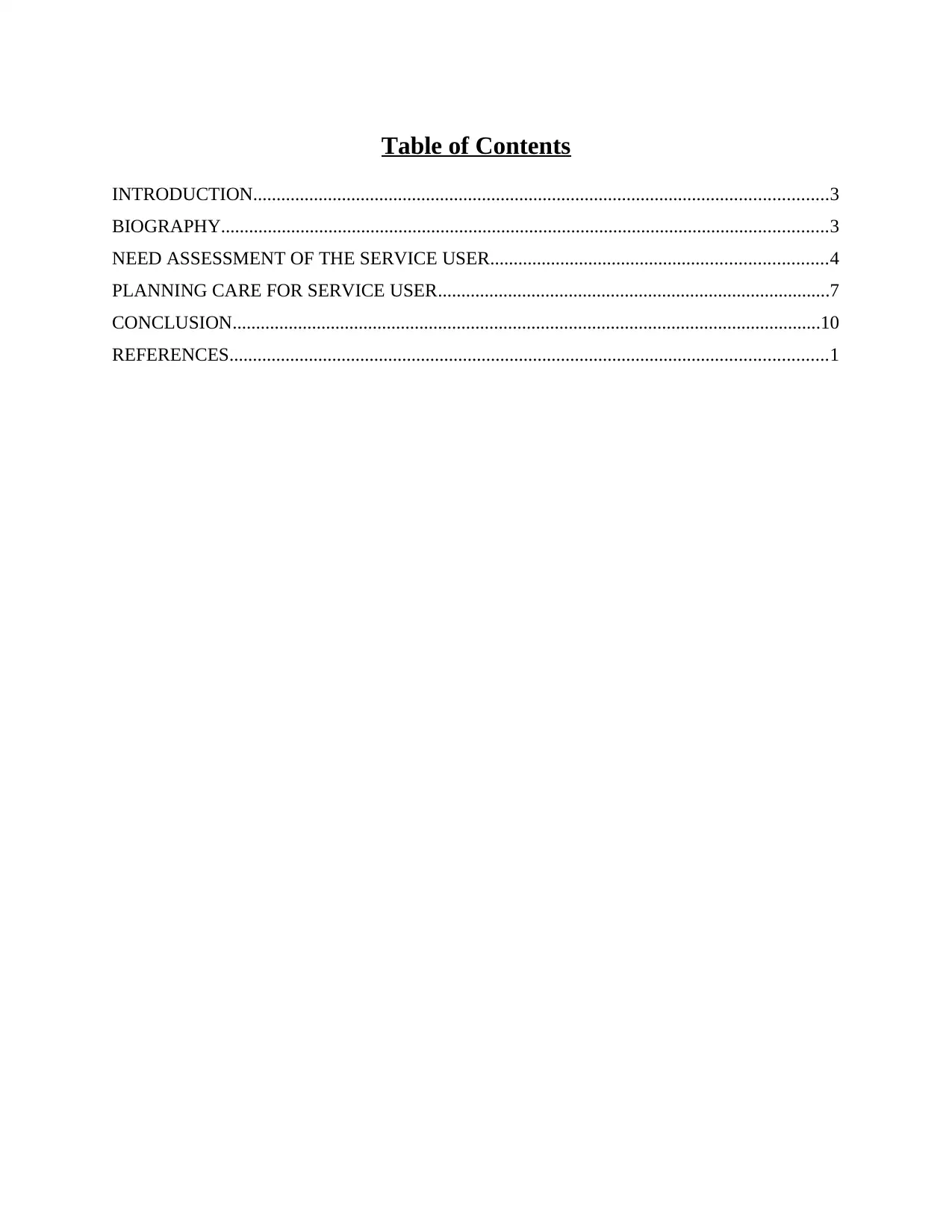
Table of Contents
INTRODUCTION...........................................................................................................................3
BIOGRAPHY..................................................................................................................................3
NEED ASSESSMENT OF THE SERVICE USER........................................................................4
PLANNING CARE FOR SERVICE USER....................................................................................7
CONCLUSION..............................................................................................................................10
REFERENCES................................................................................................................................1
INTRODUCTION...........................................................................................................................3
BIOGRAPHY..................................................................................................................................3
NEED ASSESSMENT OF THE SERVICE USER........................................................................4
PLANNING CARE FOR SERVICE USER....................................................................................7
CONCLUSION..............................................................................................................................10
REFERENCES................................................................................................................................1
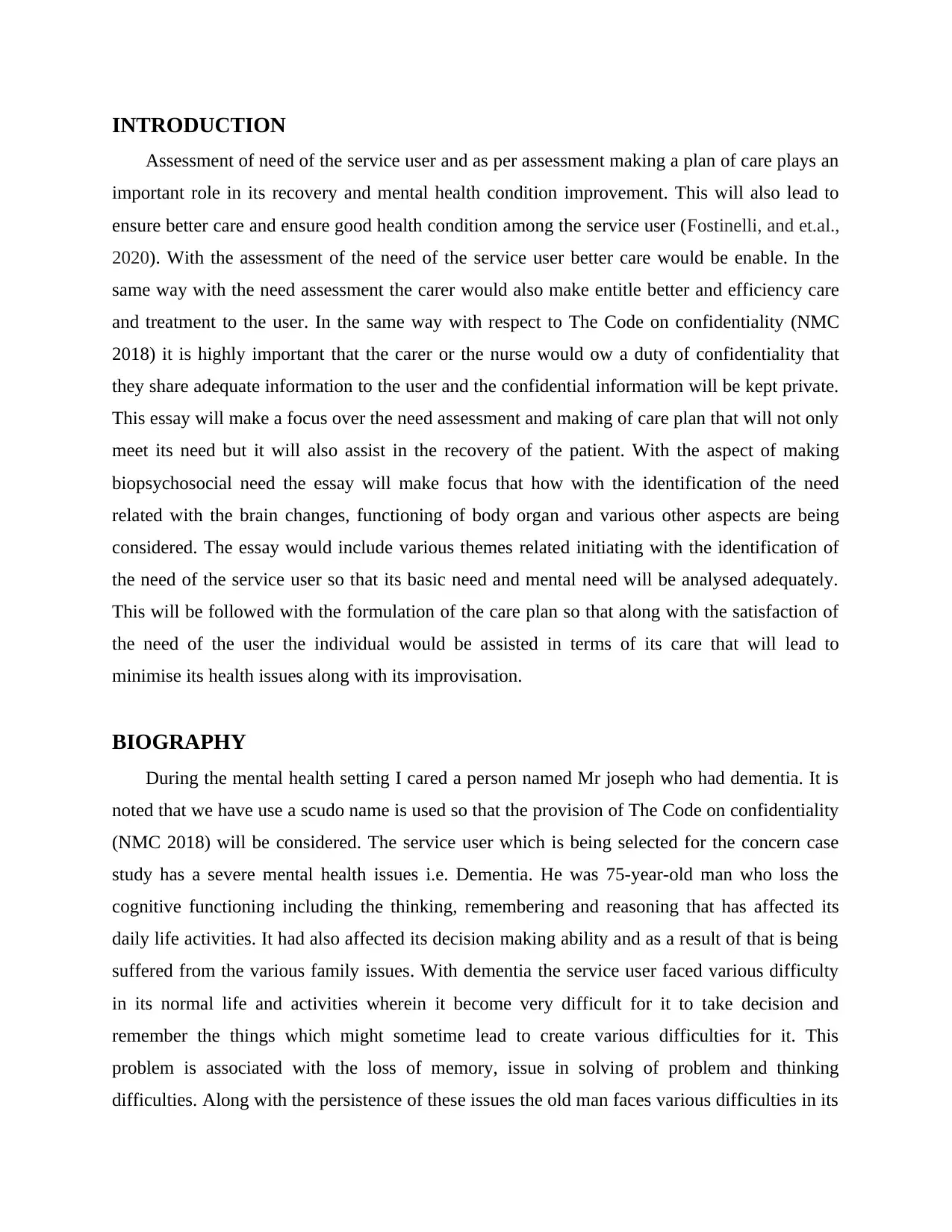
INTRODUCTION
Assessment of need of the service user and as per assessment making a plan of care plays an
important role in its recovery and mental health condition improvement. This will also lead to
ensure better care and ensure good health condition among the service user (Fostinelli, and et.al.,
2020). With the assessment of the need of the service user better care would be enable. In the
same way with the need assessment the carer would also make entitle better and efficiency care
and treatment to the user. In the same way with respect to The Code on confidentiality (NMC
2018) it is highly important that the carer or the nurse would ow a duty of confidentiality that
they share adequate information to the user and the confidential information will be kept private.
This essay will make a focus over the need assessment and making of care plan that will not only
meet its need but it will also assist in the recovery of the patient. With the aspect of making
biopsychosocial need the essay will make focus that how with the identification of the need
related with the brain changes, functioning of body organ and various other aspects are being
considered. The essay would include various themes related initiating with the identification of
the need of the service user so that its basic need and mental need will be analysed adequately.
This will be followed with the formulation of the care plan so that along with the satisfaction of
the need of the user the individual would be assisted in terms of its care that will lead to
minimise its health issues along with its improvisation.
BIOGRAPHY
During the mental health setting I cared a person named Mr joseph who had dementia. It is
noted that we have use a scudo name is used so that the provision of The Code on confidentiality
(NMC 2018) will be considered. The service user which is being selected for the concern case
study has a severe mental health issues i.e. Dementia. He was 75-year-old man who loss the
cognitive functioning including the thinking, remembering and reasoning that has affected its
daily life activities. It had also affected its decision making ability and as a result of that is being
suffered from the various family issues. With dementia the service user faced various difficulty
in its normal life and activities wherein it become very difficult for it to take decision and
remember the things which might sometime lead to create various difficulties for it. This
problem is associated with the loss of memory, issue in solving of problem and thinking
difficulties. Along with the persistence of these issues the old man faces various difficulties in its
Assessment of need of the service user and as per assessment making a plan of care plays an
important role in its recovery and mental health condition improvement. This will also lead to
ensure better care and ensure good health condition among the service user (Fostinelli, and et.al.,
2020). With the assessment of the need of the service user better care would be enable. In the
same way with the need assessment the carer would also make entitle better and efficiency care
and treatment to the user. In the same way with respect to The Code on confidentiality (NMC
2018) it is highly important that the carer or the nurse would ow a duty of confidentiality that
they share adequate information to the user and the confidential information will be kept private.
This essay will make a focus over the need assessment and making of care plan that will not only
meet its need but it will also assist in the recovery of the patient. With the aspect of making
biopsychosocial need the essay will make focus that how with the identification of the need
related with the brain changes, functioning of body organ and various other aspects are being
considered. The essay would include various themes related initiating with the identification of
the need of the service user so that its basic need and mental need will be analysed adequately.
This will be followed with the formulation of the care plan so that along with the satisfaction of
the need of the user the individual would be assisted in terms of its care that will lead to
minimise its health issues along with its improvisation.
BIOGRAPHY
During the mental health setting I cared a person named Mr joseph who had dementia. It is
noted that we have use a scudo name is used so that the provision of The Code on confidentiality
(NMC 2018) will be considered. The service user which is being selected for the concern case
study has a severe mental health issues i.e. Dementia. He was 75-year-old man who loss the
cognitive functioning including the thinking, remembering and reasoning that has affected its
daily life activities. It had also affected its decision making ability and as a result of that is being
suffered from the various family issues. With dementia the service user faced various difficulty
in its normal life and activities wherein it become very difficult for it to take decision and
remember the things which might sometime lead to create various difficulties for it. This
problem is associated with the loss of memory, issue in solving of problem and thinking
difficulties. Along with the persistence of these issues the old man faces various difficulties in its
⊘ This is a preview!⊘
Do you want full access?
Subscribe today to unlock all pages.

Trusted by 1+ million students worldwide
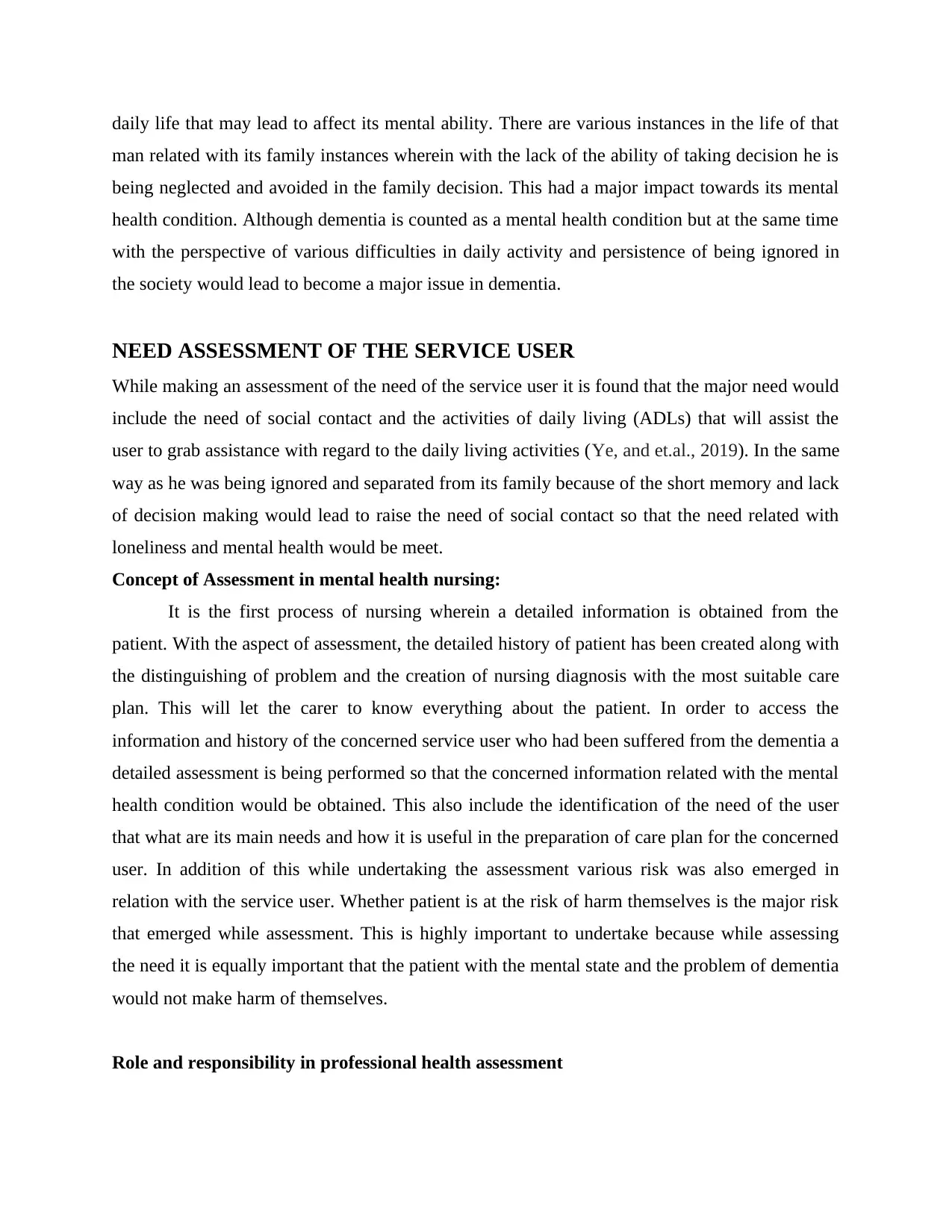
daily life that may lead to affect its mental ability. There are various instances in the life of that
man related with its family instances wherein with the lack of the ability of taking decision he is
being neglected and avoided in the family decision. This had a major impact towards its mental
health condition. Although dementia is counted as a mental health condition but at the same time
with the perspective of various difficulties in daily activity and persistence of being ignored in
the society would lead to become a major issue in dementia.
NEED ASSESSMENT OF THE SERVICE USER
While making an assessment of the need of the service user it is found that the major need would
include the need of social contact and the activities of daily living (ADLs) that will assist the
user to grab assistance with regard to the daily living activities (Ye, and et.al., 2019). In the same
way as he was being ignored and separated from its family because of the short memory and lack
of decision making would lead to raise the need of social contact so that the need related with
loneliness and mental health would be meet.
Concept of Assessment in mental health nursing:
It is the first process of nursing wherein a detailed information is obtained from the
patient. With the aspect of assessment, the detailed history of patient has been created along with
the distinguishing of problem and the creation of nursing diagnosis with the most suitable care
plan. This will let the carer to know everything about the patient. In order to access the
information and history of the concerned service user who had been suffered from the dementia a
detailed assessment is being performed so that the concerned information related with the mental
health condition would be obtained. This also include the identification of the need of the user
that what are its main needs and how it is useful in the preparation of care plan for the concerned
user. In addition of this while undertaking the assessment various risk was also emerged in
relation with the service user. Whether patient is at the risk of harm themselves is the major risk
that emerged while assessment. This is highly important to undertake because while assessing
the need it is equally important that the patient with the mental state and the problem of dementia
would not make harm of themselves.
Role and responsibility in professional health assessment
man related with its family instances wherein with the lack of the ability of taking decision he is
being neglected and avoided in the family decision. This had a major impact towards its mental
health condition. Although dementia is counted as a mental health condition but at the same time
with the perspective of various difficulties in daily activity and persistence of being ignored in
the society would lead to become a major issue in dementia.
NEED ASSESSMENT OF THE SERVICE USER
While making an assessment of the need of the service user it is found that the major need would
include the need of social contact and the activities of daily living (ADLs) that will assist the
user to grab assistance with regard to the daily living activities (Ye, and et.al., 2019). In the same
way as he was being ignored and separated from its family because of the short memory and lack
of decision making would lead to raise the need of social contact so that the need related with
loneliness and mental health would be meet.
Concept of Assessment in mental health nursing:
It is the first process of nursing wherein a detailed information is obtained from the
patient. With the aspect of assessment, the detailed history of patient has been created along with
the distinguishing of problem and the creation of nursing diagnosis with the most suitable care
plan. This will let the carer to know everything about the patient. In order to access the
information and history of the concerned service user who had been suffered from the dementia a
detailed assessment is being performed so that the concerned information related with the mental
health condition would be obtained. This also include the identification of the need of the user
that what are its main needs and how it is useful in the preparation of care plan for the concerned
user. In addition of this while undertaking the assessment various risk was also emerged in
relation with the service user. Whether patient is at the risk of harm themselves is the major risk
that emerged while assessment. This is highly important to undertake because while assessing
the need it is equally important that the patient with the mental state and the problem of dementia
would not make harm of themselves.
Role and responsibility in professional health assessment
Paraphrase This Document
Need a fresh take? Get an instant paraphrase of this document with our AI Paraphraser
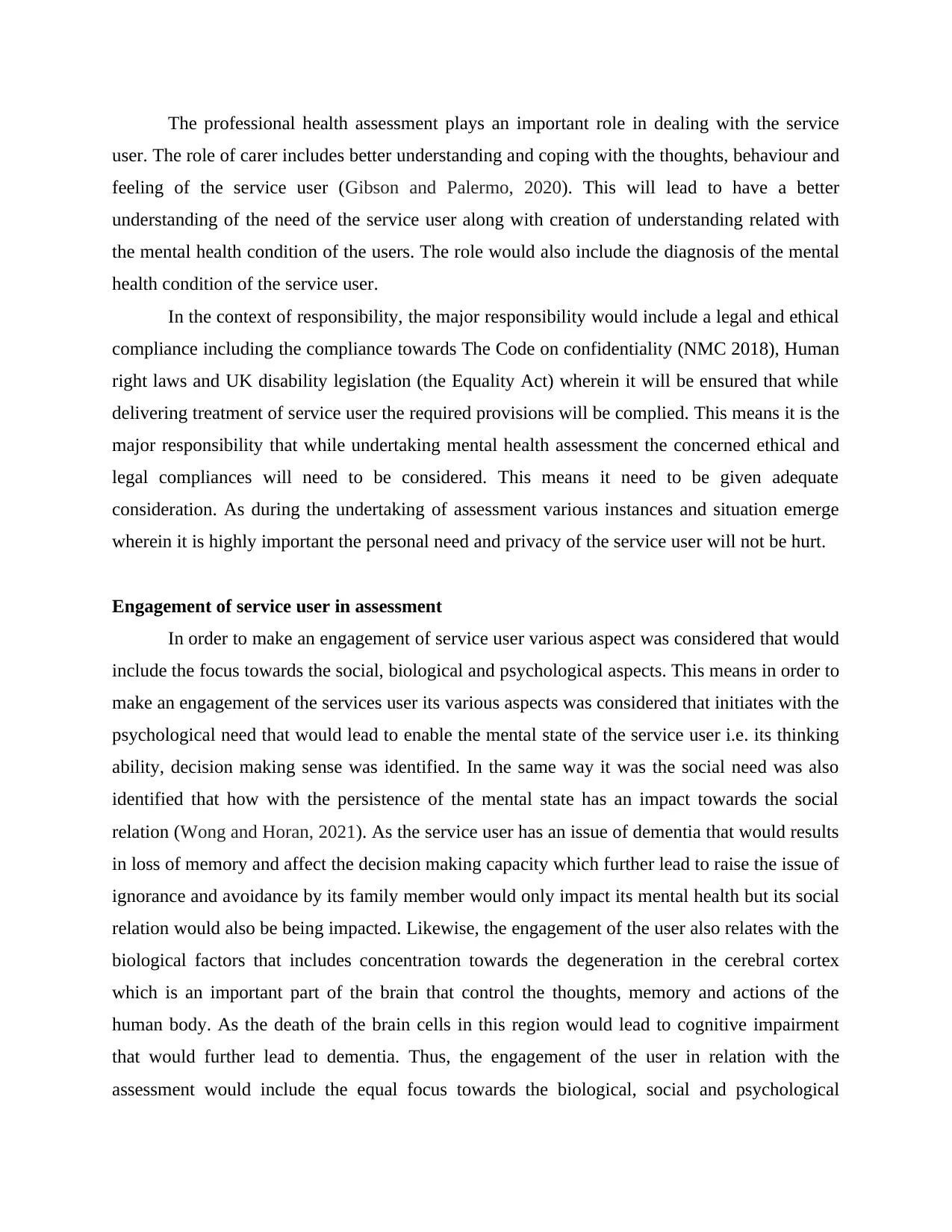
The professional health assessment plays an important role in dealing with the service
user. The role of carer includes better understanding and coping with the thoughts, behaviour and
feeling of the service user (Gibson and Palermo, 2020). This will lead to have a better
understanding of the need of the service user along with creation of understanding related with
the mental health condition of the users. The role would also include the diagnosis of the mental
health condition of the service user.
In the context of responsibility, the major responsibility would include a legal and ethical
compliance including the compliance towards The Code on confidentiality (NMC 2018), Human
right laws and UK disability legislation (the Equality Act) wherein it will be ensured that while
delivering treatment of service user the required provisions will be complied. This means it is the
major responsibility that while undertaking mental health assessment the concerned ethical and
legal compliances will need to be considered. This means it need to be given adequate
consideration. As during the undertaking of assessment various instances and situation emerge
wherein it is highly important the personal need and privacy of the service user will not be hurt.
Engagement of service user in assessment
In order to make an engagement of service user various aspect was considered that would
include the focus towards the social, biological and psychological aspects. This means in order to
make an engagement of the services user its various aspects was considered that initiates with the
psychological need that would lead to enable the mental state of the service user i.e. its thinking
ability, decision making sense was identified. In the same way it was the social need was also
identified that how with the persistence of the mental state has an impact towards the social
relation (Wong and Horan, 2021). As the service user has an issue of dementia that would results
in loss of memory and affect the decision making capacity which further lead to raise the issue of
ignorance and avoidance by its family member would only impact its mental health but its social
relation would also be being impacted. Likewise, the engagement of the user also relates with the
biological factors that includes concentration towards the degeneration in the cerebral cortex
which is an important part of the brain that control the thoughts, memory and actions of the
human body. As the death of the brain cells in this region would lead to cognitive impairment
that would further lead to dementia. Thus, the engagement of the user in relation with the
assessment would include the equal focus towards the biological, social and psychological
user. The role of carer includes better understanding and coping with the thoughts, behaviour and
feeling of the service user (Gibson and Palermo, 2020). This will lead to have a better
understanding of the need of the service user along with creation of understanding related with
the mental health condition of the users. The role would also include the diagnosis of the mental
health condition of the service user.
In the context of responsibility, the major responsibility would include a legal and ethical
compliance including the compliance towards The Code on confidentiality (NMC 2018), Human
right laws and UK disability legislation (the Equality Act) wherein it will be ensured that while
delivering treatment of service user the required provisions will be complied. This means it is the
major responsibility that while undertaking mental health assessment the concerned ethical and
legal compliances will need to be considered. This means it need to be given adequate
consideration. As during the undertaking of assessment various instances and situation emerge
wherein it is highly important the personal need and privacy of the service user will not be hurt.
Engagement of service user in assessment
In order to make an engagement of service user various aspect was considered that would
include the focus towards the social, biological and psychological aspects. This means in order to
make an engagement of the services user its various aspects was considered that initiates with the
psychological need that would lead to enable the mental state of the service user i.e. its thinking
ability, decision making sense was identified. In the same way it was the social need was also
identified that how with the persistence of the mental state has an impact towards the social
relation (Wong and Horan, 2021). As the service user has an issue of dementia that would results
in loss of memory and affect the decision making capacity which further lead to raise the issue of
ignorance and avoidance by its family member would only impact its mental health but its social
relation would also be being impacted. Likewise, the engagement of the user also relates with the
biological factors that includes concentration towards the degeneration in the cerebral cortex
which is an important part of the brain that control the thoughts, memory and actions of the
human body. As the death of the brain cells in this region would lead to cognitive impairment
that would further lead to dementia. Thus, the engagement of the user in relation with the
assessment would include the equal focus towards the biological, social and psychological
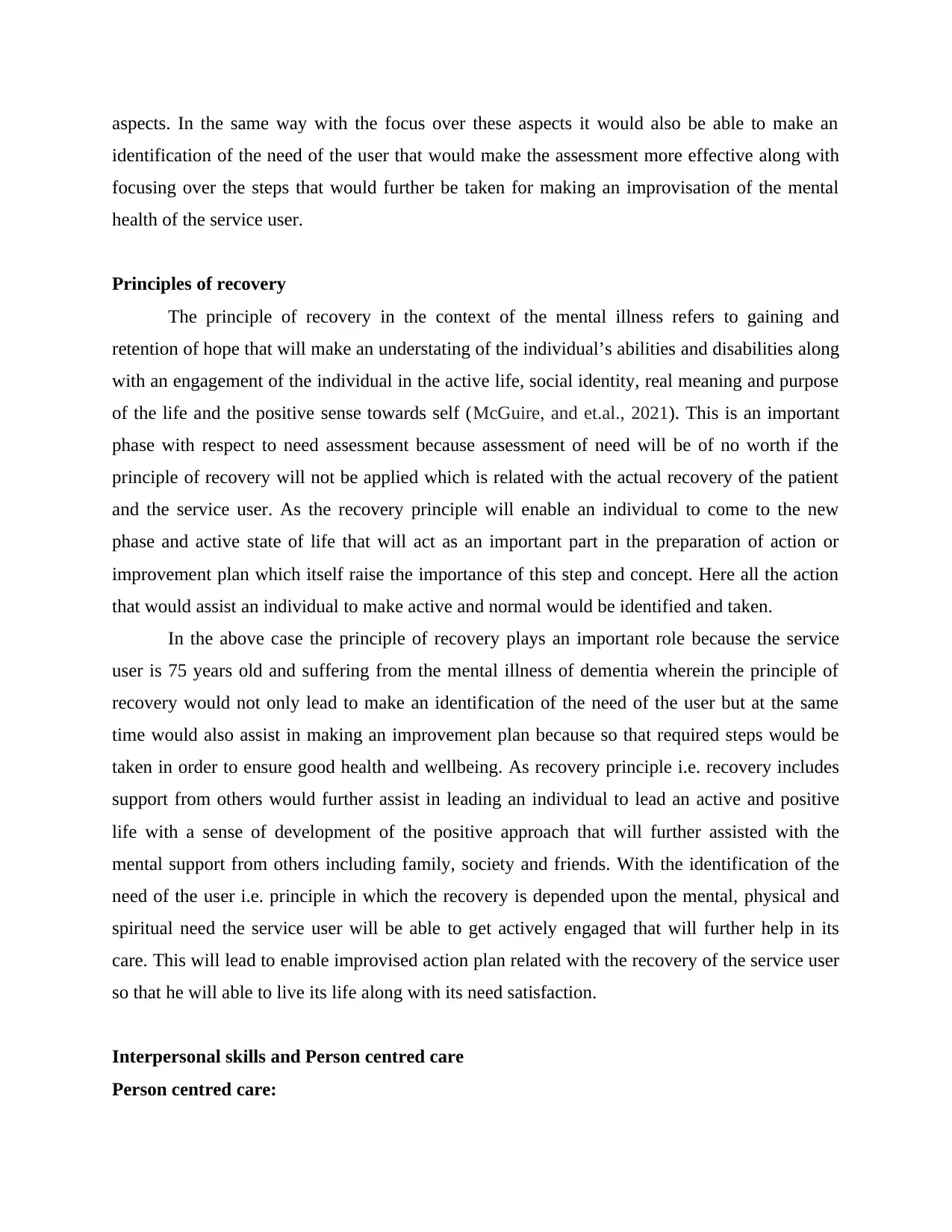
aspects. In the same way with the focus over these aspects it would also be able to make an
identification of the need of the user that would make the assessment more effective along with
focusing over the steps that would further be taken for making an improvisation of the mental
health of the service user.
Principles of recovery
The principle of recovery in the context of the mental illness refers to gaining and
retention of hope that will make an understating of the individual’s abilities and disabilities along
with an engagement of the individual in the active life, social identity, real meaning and purpose
of the life and the positive sense towards self (McGuire, and et.al., 2021). This is an important
phase with respect to need assessment because assessment of need will be of no worth if the
principle of recovery will not be applied which is related with the actual recovery of the patient
and the service user. As the recovery principle will enable an individual to come to the new
phase and active state of life that will act as an important part in the preparation of action or
improvement plan which itself raise the importance of this step and concept. Here all the action
that would assist an individual to make active and normal would be identified and taken.
In the above case the principle of recovery plays an important role because the service
user is 75 years old and suffering from the mental illness of dementia wherein the principle of
recovery would not only lead to make an identification of the need of the user but at the same
time would also assist in making an improvement plan because so that required steps would be
taken in order to ensure good health and wellbeing. As recovery principle i.e. recovery includes
support from others would further assist in leading an individual to lead an active and positive
life with a sense of development of the positive approach that will further assisted with the
mental support from others including family, society and friends. With the identification of the
need of the user i.e. principle in which the recovery is depended upon the mental, physical and
spiritual need the service user will be able to get actively engaged that will further help in its
care. This will lead to enable improvised action plan related with the recovery of the service user
so that he will able to live its life along with its need satisfaction.
Interpersonal skills and Person centred care
Person centred care:
identification of the need of the user that would make the assessment more effective along with
focusing over the steps that would further be taken for making an improvisation of the mental
health of the service user.
Principles of recovery
The principle of recovery in the context of the mental illness refers to gaining and
retention of hope that will make an understating of the individual’s abilities and disabilities along
with an engagement of the individual in the active life, social identity, real meaning and purpose
of the life and the positive sense towards self (McGuire, and et.al., 2021). This is an important
phase with respect to need assessment because assessment of need will be of no worth if the
principle of recovery will not be applied which is related with the actual recovery of the patient
and the service user. As the recovery principle will enable an individual to come to the new
phase and active state of life that will act as an important part in the preparation of action or
improvement plan which itself raise the importance of this step and concept. Here all the action
that would assist an individual to make active and normal would be identified and taken.
In the above case the principle of recovery plays an important role because the service
user is 75 years old and suffering from the mental illness of dementia wherein the principle of
recovery would not only lead to make an identification of the need of the user but at the same
time would also assist in making an improvement plan because so that required steps would be
taken in order to ensure good health and wellbeing. As recovery principle i.e. recovery includes
support from others would further assist in leading an individual to lead an active and positive
life with a sense of development of the positive approach that will further assisted with the
mental support from others including family, society and friends. With the identification of the
need of the user i.e. principle in which the recovery is depended upon the mental, physical and
spiritual need the service user will be able to get actively engaged that will further help in its
care. This will lead to enable improvised action plan related with the recovery of the service user
so that he will able to live its life along with its need satisfaction.
Interpersonal skills and Person centred care
Person centred care:
⊘ This is a preview!⊘
Do you want full access?
Subscribe today to unlock all pages.

Trusted by 1+ million students worldwide
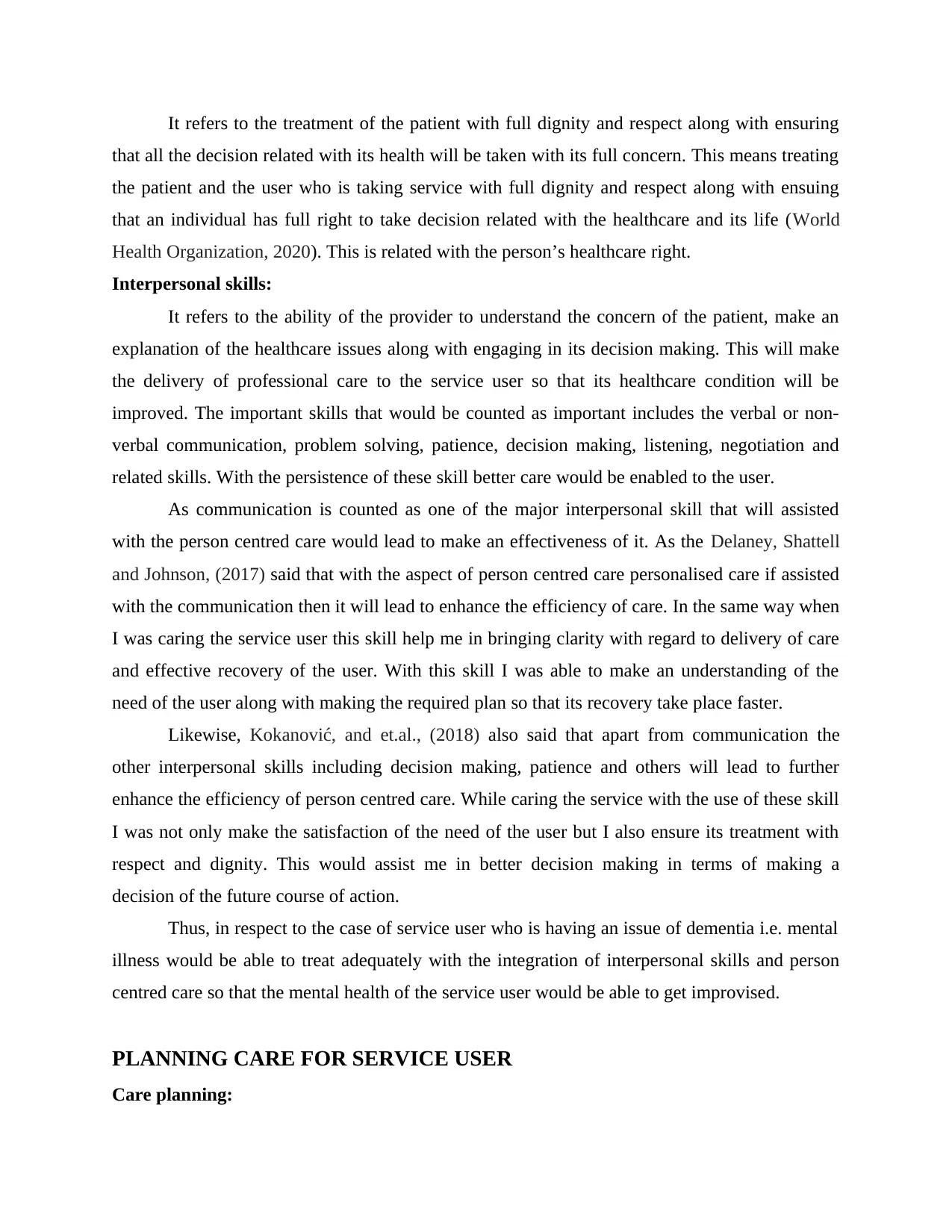
It refers to the treatment of the patient with full dignity and respect along with ensuring
that all the decision related with its health will be taken with its full concern. This means treating
the patient and the user who is taking service with full dignity and respect along with ensuing
that an individual has full right to take decision related with the healthcare and its life (World
Health Organization, 2020). This is related with the person’s healthcare right.
Interpersonal skills:
It refers to the ability of the provider to understand the concern of the patient, make an
explanation of the healthcare issues along with engaging in its decision making. This will make
the delivery of professional care to the service user so that its healthcare condition will be
improved. The important skills that would be counted as important includes the verbal or non-
verbal communication, problem solving, patience, decision making, listening, negotiation and
related skills. With the persistence of these skill better care would be enabled to the user.
As communication is counted as one of the major interpersonal skill that will assisted
with the person centred care would lead to make an effectiveness of it. As the Delaney, Shattell
and Johnson, (2017) said that with the aspect of person centred care personalised care if assisted
with the communication then it will lead to enhance the efficiency of care. In the same way when
I was caring the service user this skill help me in bringing clarity with regard to delivery of care
and effective recovery of the user. With this skill I was able to make an understanding of the
need of the user along with making the required plan so that its recovery take place faster.
Likewise, Kokanović, and et.al., (2018) also said that apart from communication the
other interpersonal skills including decision making, patience and others will lead to further
enhance the efficiency of person centred care. While caring the service with the use of these skill
I was not only make the satisfaction of the need of the user but I also ensure its treatment with
respect and dignity. This would assist me in better decision making in terms of making a
decision of the future course of action.
Thus, in respect to the case of service user who is having an issue of dementia i.e. mental
illness would be able to treat adequately with the integration of interpersonal skills and person
centred care so that the mental health of the service user would be able to get improvised.
PLANNING CARE FOR SERVICE USER
Care planning:
that all the decision related with its health will be taken with its full concern. This means treating
the patient and the user who is taking service with full dignity and respect along with ensuing
that an individual has full right to take decision related with the healthcare and its life (World
Health Organization, 2020). This is related with the person’s healthcare right.
Interpersonal skills:
It refers to the ability of the provider to understand the concern of the patient, make an
explanation of the healthcare issues along with engaging in its decision making. This will make
the delivery of professional care to the service user so that its healthcare condition will be
improved. The important skills that would be counted as important includes the verbal or non-
verbal communication, problem solving, patience, decision making, listening, negotiation and
related skills. With the persistence of these skill better care would be enabled to the user.
As communication is counted as one of the major interpersonal skill that will assisted
with the person centred care would lead to make an effectiveness of it. As the Delaney, Shattell
and Johnson, (2017) said that with the aspect of person centred care personalised care if assisted
with the communication then it will lead to enhance the efficiency of care. In the same way when
I was caring the service user this skill help me in bringing clarity with regard to delivery of care
and effective recovery of the user. With this skill I was able to make an understanding of the
need of the user along with making the required plan so that its recovery take place faster.
Likewise, Kokanović, and et.al., (2018) also said that apart from communication the
other interpersonal skills including decision making, patience and others will lead to further
enhance the efficiency of person centred care. While caring the service with the use of these skill
I was not only make the satisfaction of the need of the user but I also ensure its treatment with
respect and dignity. This would assist me in better decision making in terms of making a
decision of the future course of action.
Thus, in respect to the case of service user who is having an issue of dementia i.e. mental
illness would be able to treat adequately with the integration of interpersonal skills and person
centred care so that the mental health of the service user would be able to get improvised.
PLANNING CARE FOR SERVICE USER
Care planning:
Paraphrase This Document
Need a fresh take? Get an instant paraphrase of this document with our AI Paraphraser
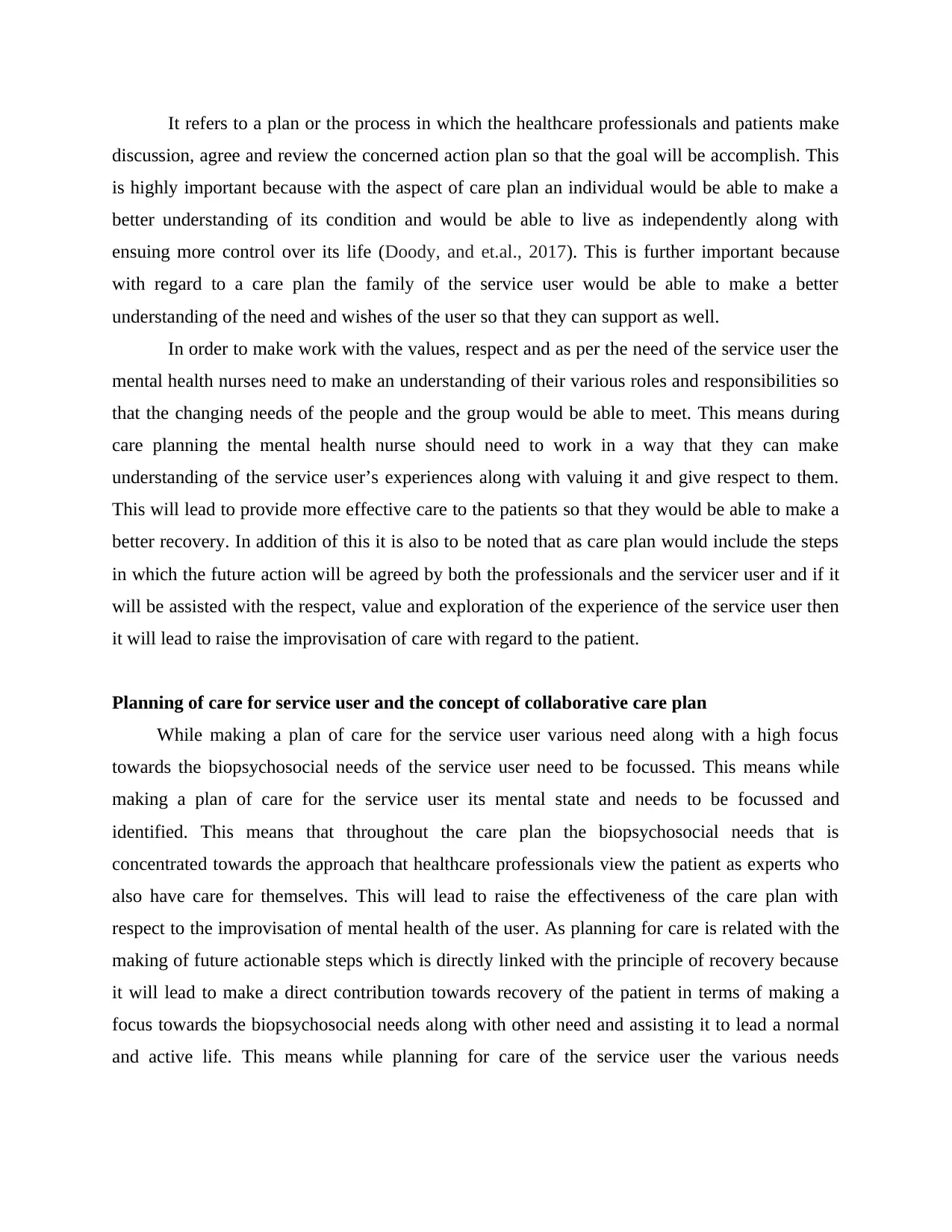
It refers to a plan or the process in which the healthcare professionals and patients make
discussion, agree and review the concerned action plan so that the goal will be accomplish. This
is highly important because with the aspect of care plan an individual would be able to make a
better understanding of its condition and would be able to live as independently along with
ensuing more control over its life (Doody, and et.al., 2017). This is further important because
with regard to a care plan the family of the service user would be able to make a better
understanding of the need and wishes of the user so that they can support as well.
In order to make work with the values, respect and as per the need of the service user the
mental health nurses need to make an understanding of their various roles and responsibilities so
that the changing needs of the people and the group would be able to meet. This means during
care planning the mental health nurse should need to work in a way that they can make
understanding of the service user’s experiences along with valuing it and give respect to them.
This will lead to provide more effective care to the patients so that they would be able to make a
better recovery. In addition of this it is also to be noted that as care plan would include the steps
in which the future action will be agreed by both the professionals and the servicer user and if it
will be assisted with the respect, value and exploration of the experience of the service user then
it will lead to raise the improvisation of care with regard to the patient.
Planning of care for service user and the concept of collaborative care plan
While making a plan of care for the service user various need along with a high focus
towards the biopsychosocial needs of the service user need to be focussed. This means while
making a plan of care for the service user its mental state and needs to be focussed and
identified. This means that throughout the care plan the biopsychosocial needs that is
concentrated towards the approach that healthcare professionals view the patient as experts who
also have care for themselves. This will lead to raise the effectiveness of the care plan with
respect to the improvisation of mental health of the user. As planning for care is related with the
making of future actionable steps which is directly linked with the principle of recovery because
it will lead to make a direct contribution towards recovery of the patient in terms of making a
focus towards the biopsychosocial needs along with other need and assisting it to lead a normal
and active life. This means while planning for care of the service user the various needs
discussion, agree and review the concerned action plan so that the goal will be accomplish. This
is highly important because with the aspect of care plan an individual would be able to make a
better understanding of its condition and would be able to live as independently along with
ensuing more control over its life (Doody, and et.al., 2017). This is further important because
with regard to a care plan the family of the service user would be able to make a better
understanding of the need and wishes of the user so that they can support as well.
In order to make work with the values, respect and as per the need of the service user the
mental health nurses need to make an understanding of their various roles and responsibilities so
that the changing needs of the people and the group would be able to meet. This means during
care planning the mental health nurse should need to work in a way that they can make
understanding of the service user’s experiences along with valuing it and give respect to them.
This will lead to provide more effective care to the patients so that they would be able to make a
better recovery. In addition of this it is also to be noted that as care plan would include the steps
in which the future action will be agreed by both the professionals and the servicer user and if it
will be assisted with the respect, value and exploration of the experience of the service user then
it will lead to raise the improvisation of care with regard to the patient.
Planning of care for service user and the concept of collaborative care plan
While making a plan of care for the service user various need along with a high focus
towards the biopsychosocial needs of the service user need to be focussed. This means while
making a plan of care for the service user its mental state and needs to be focussed and
identified. This means that throughout the care plan the biopsychosocial needs that is
concentrated towards the approach that healthcare professionals view the patient as experts who
also have care for themselves. This will lead to raise the effectiveness of the care plan with
respect to the improvisation of mental health of the user. As planning for care is related with the
making of future actionable steps which is directly linked with the principle of recovery because
it will lead to make a direct contribution towards recovery of the patient in terms of making a
focus towards the biopsychosocial needs along with other need and assisting it to lead a normal
and active life. This means while planning for care of the service user the various needs
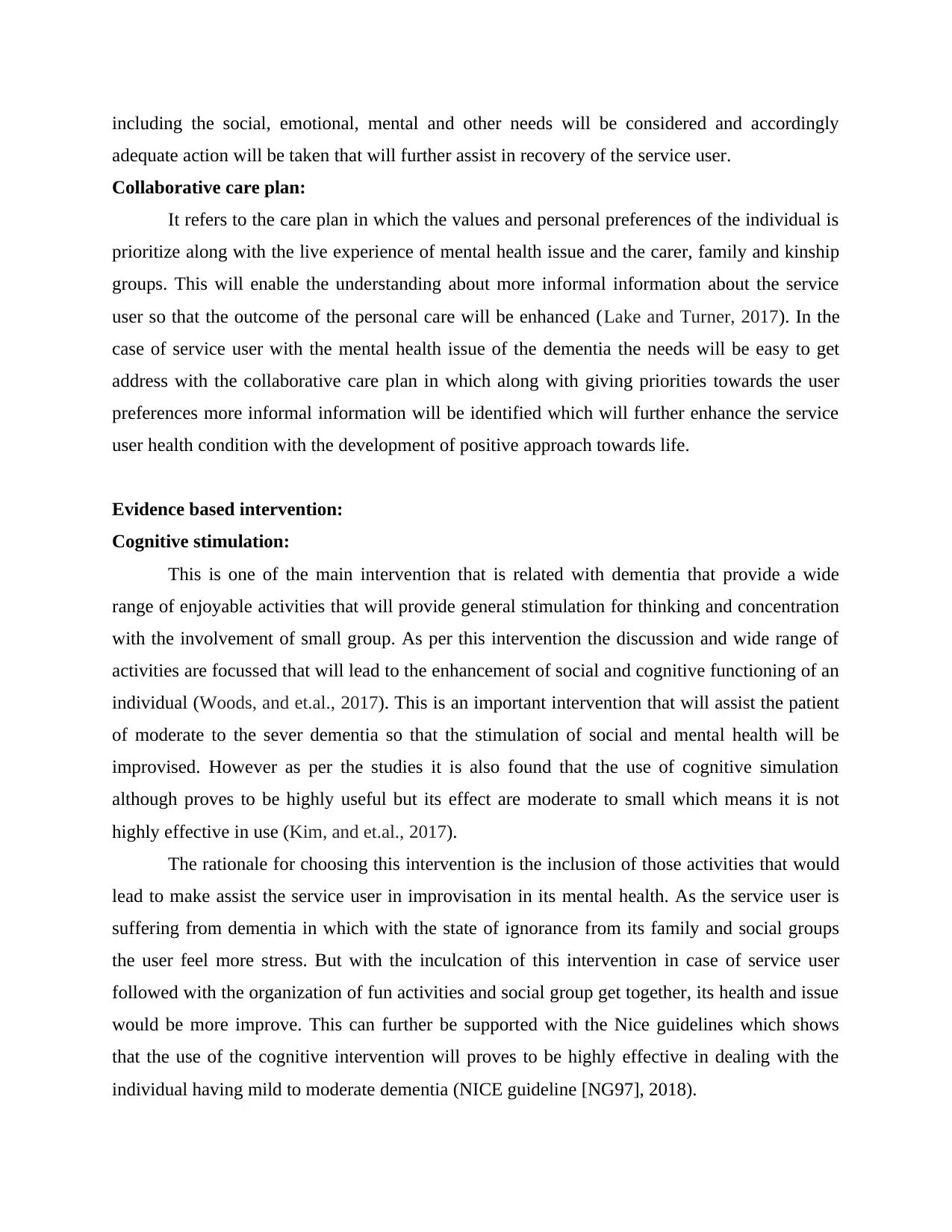
including the social, emotional, mental and other needs will be considered and accordingly
adequate action will be taken that will further assist in recovery of the service user.
Collaborative care plan:
It refers to the care plan in which the values and personal preferences of the individual is
prioritize along with the live experience of mental health issue and the carer, family and kinship
groups. This will enable the understanding about more informal information about the service
user so that the outcome of the personal care will be enhanced (Lake and Turner, 2017). In the
case of service user with the mental health issue of the dementia the needs will be easy to get
address with the collaborative care plan in which along with giving priorities towards the user
preferences more informal information will be identified which will further enhance the service
user health condition with the development of positive approach towards life.
Evidence based intervention:
Cognitive stimulation:
This is one of the main intervention that is related with dementia that provide a wide
range of enjoyable activities that will provide general stimulation for thinking and concentration
with the involvement of small group. As per this intervention the discussion and wide range of
activities are focussed that will lead to the enhancement of social and cognitive functioning of an
individual (Woods, and et.al., 2017). This is an important intervention that will assist the patient
of moderate to the sever dementia so that the stimulation of social and mental health will be
improvised. However as per the studies it is also found that the use of cognitive simulation
although proves to be highly useful but its effect are moderate to small which means it is not
highly effective in use (Kim, and et.al., 2017).
The rationale for choosing this intervention is the inclusion of those activities that would
lead to make assist the service user in improvisation in its mental health. As the service user is
suffering from dementia in which with the state of ignorance from its family and social groups
the user feel more stress. But with the inculcation of this intervention in case of service user
followed with the organization of fun activities and social group get together, its health and issue
would be more improve. This can further be supported with the Nice guidelines which shows
that the use of the cognitive intervention will proves to be highly effective in dealing with the
individual having mild to moderate dementia (NICE guideline [NG97], 2018).
adequate action will be taken that will further assist in recovery of the service user.
Collaborative care plan:
It refers to the care plan in which the values and personal preferences of the individual is
prioritize along with the live experience of mental health issue and the carer, family and kinship
groups. This will enable the understanding about more informal information about the service
user so that the outcome of the personal care will be enhanced (Lake and Turner, 2017). In the
case of service user with the mental health issue of the dementia the needs will be easy to get
address with the collaborative care plan in which along with giving priorities towards the user
preferences more informal information will be identified which will further enhance the service
user health condition with the development of positive approach towards life.
Evidence based intervention:
Cognitive stimulation:
This is one of the main intervention that is related with dementia that provide a wide
range of enjoyable activities that will provide general stimulation for thinking and concentration
with the involvement of small group. As per this intervention the discussion and wide range of
activities are focussed that will lead to the enhancement of social and cognitive functioning of an
individual (Woods, and et.al., 2017). This is an important intervention that will assist the patient
of moderate to the sever dementia so that the stimulation of social and mental health will be
improvised. However as per the studies it is also found that the use of cognitive simulation
although proves to be highly useful but its effect are moderate to small which means it is not
highly effective in use (Kim, and et.al., 2017).
The rationale for choosing this intervention is the inclusion of those activities that would
lead to make assist the service user in improvisation in its mental health. As the service user is
suffering from dementia in which with the state of ignorance from its family and social groups
the user feel more stress. But with the inculcation of this intervention in case of service user
followed with the organization of fun activities and social group get together, its health and issue
would be more improve. This can further be supported with the Nice guidelines which shows
that the use of the cognitive intervention will proves to be highly effective in dealing with the
individual having mild to moderate dementia (NICE guideline [NG97], 2018).
⊘ This is a preview!⊘
Do you want full access?
Subscribe today to unlock all pages.

Trusted by 1+ million students worldwide
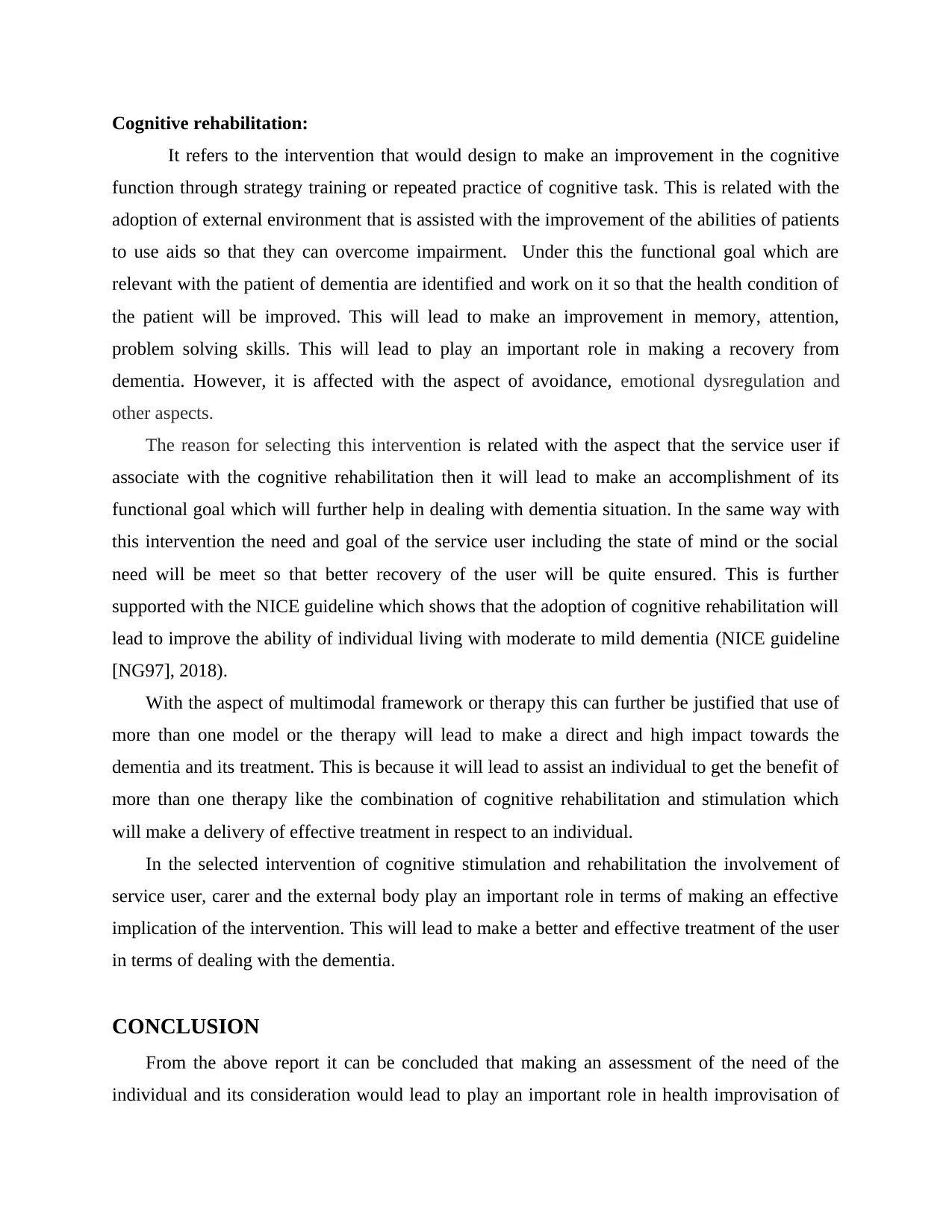
Cognitive rehabilitation:
It refers to the intervention that would design to make an improvement in the cognitive
function through strategy training or repeated practice of cognitive task. This is related with the
adoption of external environment that is assisted with the improvement of the abilities of patients
to use aids so that they can overcome impairment. Under this the functional goal which are
relevant with the patient of dementia are identified and work on it so that the health condition of
the patient will be improved. This will lead to make an improvement in memory, attention,
problem solving skills. This will lead to play an important role in making a recovery from
dementia. However, it is affected with the aspect of avoidance, emotional dysregulation and
other aspects.
The reason for selecting this intervention is related with the aspect that the service user if
associate with the cognitive rehabilitation then it will lead to make an accomplishment of its
functional goal which will further help in dealing with dementia situation. In the same way with
this intervention the need and goal of the service user including the state of mind or the social
need will be meet so that better recovery of the user will be quite ensured. This is further
supported with the NICE guideline which shows that the adoption of cognitive rehabilitation will
lead to improve the ability of individual living with moderate to mild dementia (NICE guideline
[NG97], 2018).
With the aspect of multimodal framework or therapy this can further be justified that use of
more than one model or the therapy will lead to make a direct and high impact towards the
dementia and its treatment. This is because it will lead to assist an individual to get the benefit of
more than one therapy like the combination of cognitive rehabilitation and stimulation which
will make a delivery of effective treatment in respect to an individual.
In the selected intervention of cognitive stimulation and rehabilitation the involvement of
service user, carer and the external body play an important role in terms of making an effective
implication of the intervention. This will lead to make a better and effective treatment of the user
in terms of dealing with the dementia.
CONCLUSION
From the above report it can be concluded that making an assessment of the need of the
individual and its consideration would lead to play an important role in health improvisation of
It refers to the intervention that would design to make an improvement in the cognitive
function through strategy training or repeated practice of cognitive task. This is related with the
adoption of external environment that is assisted with the improvement of the abilities of patients
to use aids so that they can overcome impairment. Under this the functional goal which are
relevant with the patient of dementia are identified and work on it so that the health condition of
the patient will be improved. This will lead to make an improvement in memory, attention,
problem solving skills. This will lead to play an important role in making a recovery from
dementia. However, it is affected with the aspect of avoidance, emotional dysregulation and
other aspects.
The reason for selecting this intervention is related with the aspect that the service user if
associate with the cognitive rehabilitation then it will lead to make an accomplishment of its
functional goal which will further help in dealing with dementia situation. In the same way with
this intervention the need and goal of the service user including the state of mind or the social
need will be meet so that better recovery of the user will be quite ensured. This is further
supported with the NICE guideline which shows that the adoption of cognitive rehabilitation will
lead to improve the ability of individual living with moderate to mild dementia (NICE guideline
[NG97], 2018).
With the aspect of multimodal framework or therapy this can further be justified that use of
more than one model or the therapy will lead to make a direct and high impact towards the
dementia and its treatment. This is because it will lead to assist an individual to get the benefit of
more than one therapy like the combination of cognitive rehabilitation and stimulation which
will make a delivery of effective treatment in respect to an individual.
In the selected intervention of cognitive stimulation and rehabilitation the involvement of
service user, carer and the external body play an important role in terms of making an effective
implication of the intervention. This will lead to make a better and effective treatment of the user
in terms of dealing with the dementia.
CONCLUSION
From the above report it can be concluded that making an assessment of the need of the
individual and its consideration would lead to play an important role in health improvisation of
Paraphrase This Document
Need a fresh take? Get an instant paraphrase of this document with our AI Paraphraser
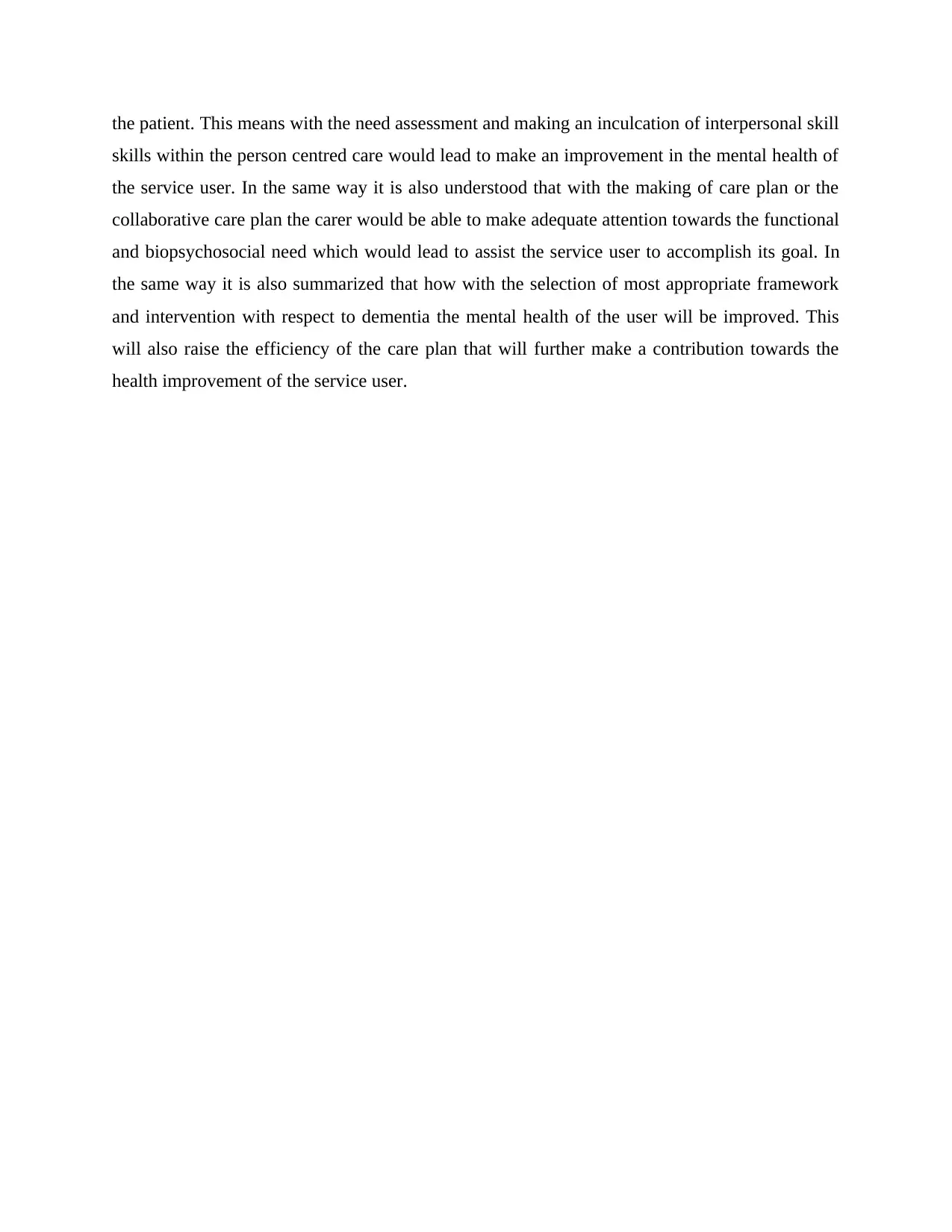
the patient. This means with the need assessment and making an inculcation of interpersonal skill
skills within the person centred care would lead to make an improvement in the mental health of
the service user. In the same way it is also understood that with the making of care plan or the
collaborative care plan the carer would be able to make adequate attention towards the functional
and biopsychosocial need which would lead to assist the service user to accomplish its goal. In
the same way it is also summarized that how with the selection of most appropriate framework
and intervention with respect to dementia the mental health of the user will be improved. This
will also raise the efficiency of the care plan that will further make a contribution towards the
health improvement of the service user.
skills within the person centred care would lead to make an improvement in the mental health of
the service user. In the same way it is also understood that with the making of care plan or the
collaborative care plan the carer would be able to make adequate attention towards the functional
and biopsychosocial need which would lead to assist the service user to accomplish its goal. In
the same way it is also summarized that how with the selection of most appropriate framework
and intervention with respect to dementia the mental health of the user will be improved. This
will also raise the efficiency of the care plan that will further make a contribution towards the
health improvement of the service user.
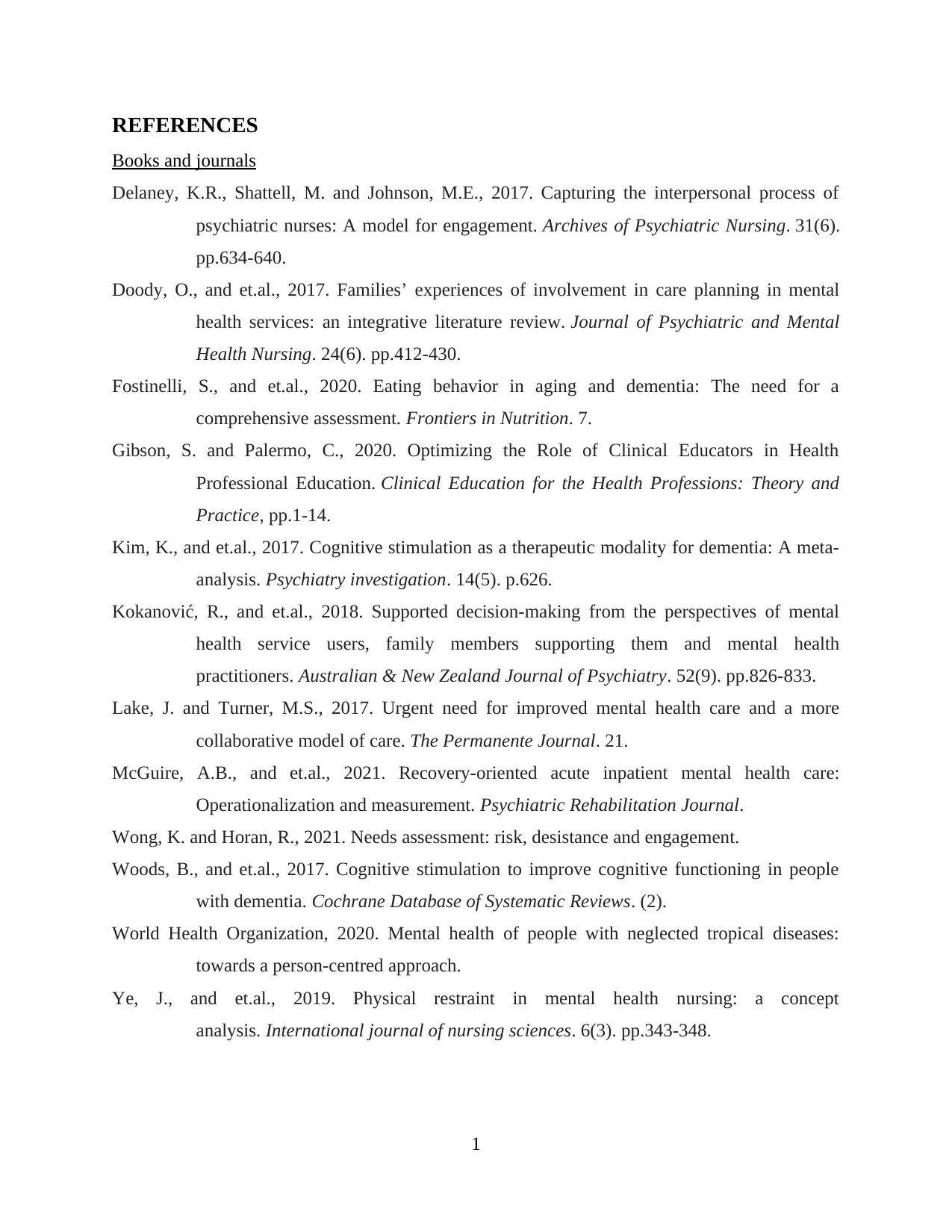
REFERENCES
Books and journals
Delaney, K.R., Shattell, M. and Johnson, M.E., 2017. Capturing the interpersonal process of
psychiatric nurses: A model for engagement. Archives of Psychiatric Nursing. 31(6).
pp.634-640.
Doody, O., and et.al., 2017. Families’ experiences of involvement in care planning in mental
health services: an integrative literature review. Journal of Psychiatric and Mental
Health Nursing. 24(6). pp.412-430.
Fostinelli, S., and et.al., 2020. Eating behavior in aging and dementia: The need for a
comprehensive assessment. Frontiers in Nutrition. 7.
Gibson, S. and Palermo, C., 2020. Optimizing the Role of Clinical Educators in Health
Professional Education. Clinical Education for the Health Professions: Theory and
Practice, pp.1-14.
Kim, K., and et.al., 2017. Cognitive stimulation as a therapeutic modality for dementia: A meta-
analysis. Psychiatry investigation. 14(5). p.626.
Kokanović, R., and et.al., 2018. Supported decision-making from the perspectives of mental
health service users, family members supporting them and mental health
practitioners. Australian & New Zealand Journal of Psychiatry. 52(9). pp.826-833.
Lake, J. and Turner, M.S., 2017. Urgent need for improved mental health care and a more
collaborative model of care. The Permanente Journal. 21.
McGuire, A.B., and et.al., 2021. Recovery-oriented acute inpatient mental health care:
Operationalization and measurement. Psychiatric Rehabilitation Journal.
Wong, K. and Horan, R., 2021. Needs assessment: risk, desistance and engagement.
Woods, B., and et.al., 2017. Cognitive stimulation to improve cognitive functioning in people
with dementia. Cochrane Database of Systematic Reviews. (2).
World Health Organization, 2020. Mental health of people with neglected tropical diseases:
towards a person-centred approach.
Ye, J., and et.al., 2019. Physical restraint in mental health nursing: a concept
analysis. International journal of nursing sciences. 6(3). pp.343-348.
1
Books and journals
Delaney, K.R., Shattell, M. and Johnson, M.E., 2017. Capturing the interpersonal process of
psychiatric nurses: A model for engagement. Archives of Psychiatric Nursing. 31(6).
pp.634-640.
Doody, O., and et.al., 2017. Families’ experiences of involvement in care planning in mental
health services: an integrative literature review. Journal of Psychiatric and Mental
Health Nursing. 24(6). pp.412-430.
Fostinelli, S., and et.al., 2020. Eating behavior in aging and dementia: The need for a
comprehensive assessment. Frontiers in Nutrition. 7.
Gibson, S. and Palermo, C., 2020. Optimizing the Role of Clinical Educators in Health
Professional Education. Clinical Education for the Health Professions: Theory and
Practice, pp.1-14.
Kim, K., and et.al., 2017. Cognitive stimulation as a therapeutic modality for dementia: A meta-
analysis. Psychiatry investigation. 14(5). p.626.
Kokanović, R., and et.al., 2018. Supported decision-making from the perspectives of mental
health service users, family members supporting them and mental health
practitioners. Australian & New Zealand Journal of Psychiatry. 52(9). pp.826-833.
Lake, J. and Turner, M.S., 2017. Urgent need for improved mental health care and a more
collaborative model of care. The Permanente Journal. 21.
McGuire, A.B., and et.al., 2021. Recovery-oriented acute inpatient mental health care:
Operationalization and measurement. Psychiatric Rehabilitation Journal.
Wong, K. and Horan, R., 2021. Needs assessment: risk, desistance and engagement.
Woods, B., and et.al., 2017. Cognitive stimulation to improve cognitive functioning in people
with dementia. Cochrane Database of Systematic Reviews. (2).
World Health Organization, 2020. Mental health of people with neglected tropical diseases:
towards a person-centred approach.
Ye, J., and et.al., 2019. Physical restraint in mental health nursing: a concept
analysis. International journal of nursing sciences. 6(3). pp.343-348.
1
⊘ This is a preview!⊘
Do you want full access?
Subscribe today to unlock all pages.

Trusted by 1+ million students worldwide
1 out of 13
Related Documents
Your All-in-One AI-Powered Toolkit for Academic Success.
+13062052269
info@desklib.com
Available 24*7 on WhatsApp / Email
![[object Object]](/_next/static/media/star-bottom.7253800d.svg)
Unlock your academic potential
Copyright © 2020–2026 A2Z Services. All Rights Reserved. Developed and managed by ZUCOL.



